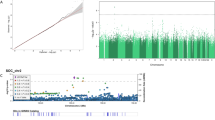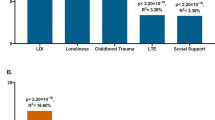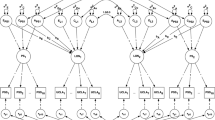Abstract
The present study investigated whether the genetic determinants of neuroticism and depressive symptoms differ from those underlying perceived psychological stress. Multivariate structural equation models, which included age and sex as modifiers, were fitted to the total sample of 798 adolescents and young adults (female, n = 459; mean age 15.5 years). The sample included 139 monozygotic and 241 dizygotic twin pairs. Stress was measured using item response theory (IRT) scores, as derived from the Perceived Stress Scale and/or the Daily Life and Stressors Scale. Neuroticism was measured using the Neo-Five Factor Inventory or the Junior Eysenck Personality Questionnaire, depending on the age of the participant. Depressive symptoms were assessed using the IRT-scores of the Somatic and Psychological Health Report. The results suggest that the genetic effects underlying perceived psychological stress are largely shared with those that influence neuroticism and liability to depressive symptoms. However, separate genetic effects for perceived psychological stress that are not shared with neuroticism and depressive symptoms were also identified. The source of the identified trait specific effects requires further investigation.

Similar content being viewed by others
References
Blokland GA, McMahon KL, Hoffman J, Zhu G, Meredith M, Martin NG, Thompson PM, de Zubicaray GI, Wright MJ (2008) Quantifying the heritability of task-related brain activation and performance during the N-back working memory task: a twin fMRI study. Biol Psychol 79(1):70–79
Cohen SK, Mermelstein R (1983) A global measure of perceived stress. J Health Soc Behav 24:385–396
de Kloet ER, Joels M, Holsboer F (2005) Stress and the brain: from adaptation to disease. Nat Rev Neurosci 6(6):463–475
Duggan CF, Lee AS, Murray RM (1990) Does personality predict long-term outcome in depression? Br J Psychiatr 157:19–24
Dumont M, Provost M (1999) Resilience in adolescents: protective role of social support, coping strategies, self-esteem, and social activities on experience of stress and depression. J Youth Adolesc 28(3):343–363
Eysenck SG (1972) Junior Eysenck Personality Inventory. Educational and Industrial Testing Service (EdITS), San Diego, CA
Fanous A, Gardner CO, Prescott CA, Cancro R, Kendler KS (2002) Neuroticism, major depression and gender: a population-based twin study. Psychol Med 32(4):719–728
Federenko IS, Schlotz W, Kirschbaum C, Bartels M, Hellhammer DH, Wust S (2006) The heritability of perceived stress. Psychol Med 36(3):375–385
Gunthert K, Cohen L, Armeli S (1999) The role of neuroticism in daily stress and coping. J Pers Soc Psychol 77(5):1087–1100
Hansell N, Wright M, Medland S, Davenport T, Wray NR, Martin NG, Hickie IB (2012) Genetic co-morbidity between neuroticism, anxiety/depression and somatic distress in a population sample of adolescent and young adult twins. Psychol Med 42(6):1249–1260
Hickie IB, Davenport TA, Hadzi-Pavlovic D, Koschera A, Naismith SL, Scott EM, Wilhelm KA (2001) Development of a simple screening tool for common mental disorders in general practice. Med J Aus 175(Suppl):S10–S17
Jardine R, Martin NG, Henderson AS, Rao DC (1984) Genetic covariation between neuroticism and the symptoms of anxiety and depression. Genet Epidemiol 1(2):89–107
Kearney C, Drabman R, Beasley J (1993) The trials of childhood: the development, reliability, and validity of the daily life stressors scale. J Child Fam Stud 2(4):371–388
Kendler KS, Kessler RC, Heath AC, Eaves LJ (1993) A longitudinal twin study of personality and major depression in women. Arch Gen Psychiatr 50(11):853–862
Kendler KS, Gatz M, Gardner CO, Pedersen NL (2006a) A Swedish national twin study of lifetime major depression. Am J Psychiatr 163(1):109–114
Kendler KS, Gatz M, Gardner CO, Pedersen NL (2006b) Personality and major depression: a swedish longitudinal, population-based twin study. Arch Gen Psychiatr 63(10):1113–1120
Kirk KM, Birley AJ, Statham DJ, HaddonB B, Lake RI, Andrews JG, Martin NG (2000) Anxiety and depression in twin and sib pairs extremely discordant and concordant for neuroticism: prodromus to a linkage study. Twin Res 3(4):299–309
Lazarus RS, Folkman S (1984) Stress, appraisal, and coping. Springer, New York
Lunn D, Thomas A, Best N, Spiegelhalter D (2000) WinBUGS—A Bayesian modelling framework: concepts, structure, and extensibility. Statistics and Computing 10:325–337
Martin NG, Martin PG (1975) The inheritance of scholastic abilities in a sample of twins, I. Ascertainments of the sample and diagnosis of zygosity. Ann Hum Genet 39:213–218
McCrae RR (1990) Controlling neuroticism in the measurement of stress. Stress Med 6(3):237–241
McCrae RR, Costa PP (2004) A contemplated revision of the NEO five-factor-inventory. Pers Individ Differ 36:587–589
Neale MC, Cardon LR (1992) Methodology of genetic studies of twins and families. Kluwer Academic, Dordrecht
Neale MB, Xie G, Maes HH (2003) Mx: statistical modeling. Richmond, VA
Rettew DC, Vink JM, Willemsen G, Doyle A, Hudziak JJ, Boomsma DI (2006) The genetic architecture of neuroticism in 3301 Dutch adolescent twins as a function of age and sex: a study from the Dutch twin register. Twin Res Hum Genet 9(1):24–29
Shrout PE, Link BG, Dohrenwend BP, Skodol AE, Stueve A, Mirotznik J (1989) Characterizing life events as risk factors for depression: the role of fateful loss events. J Abnorm Psychol 98(4):460–467
Staufenbiel SM, Penninx BW, Spijker AT, Elzinga BM, van Rossum EF (2013) Hair cortisol, stress exposure, and mental health in humans: a systematic review. Psychoneuroendocrinology 38(8):1220–1235
Sullivan PF, Neale MC, Kendler KS (2000) Genetic epidemiology of major depression: review and meta-analysis. Am J Psychiatr 157(10):1552–1562
Wray NR, Coventry WL, James MR, Montgomery GW, Eaves LJ, Martin NG (2008) Use of monozygotic twins to investigate the relationship between 5HTTLPR genotype, depression and stressful life events: an application of item response theory. Novartis Found Symp 293:48–59
Wright M, Martin NG (2004) Brisbane adolescent twin study: outline of study methods and research projects. Aus J Psychol 56(2):65–78
Acknowledgments
We thank the twins and their parents for their willingness to participate in this study. The research was supported by grants from the Australian Research Council (ARC), the National Health and the Medical Research Council (NHMRC). The support of Prof. Martin Lambert and Christine Schmäl is also gratefully acknowledged. We are grateful to Marlene Grace, Natalie Garden, and Kerry McAloney for data collection and to Anthony Conciatore for data management.
Disclosures
None.
Author information
Authors and Affiliations
Corresponding author
Rights and permissions
About this article
Cite this article
Rietschel, L., Zhu, G., Kirschbaum, C. et al. Perceived Stress has Genetic Influences Distinct from Neuroticism and Depression. Behav Genet 44, 639–645 (2014). https://doi.org/10.1007/s10519-013-9636-4
Received:
Accepted:
Published:
Issue Date:
DOI: https://doi.org/10.1007/s10519-013-9636-4




